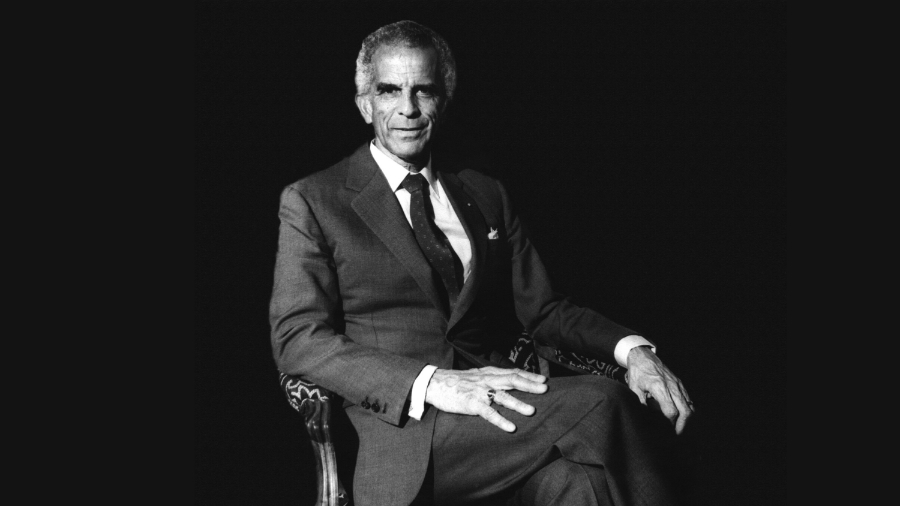This article was written by John Caher, the Unified Court System’s senior advisor for strategic and technical communications.
Photo: Franklin H. Williams
Franklin Hall Williams: Civil rights leader, lawyer, diplomat, organizer of the Peace Corps and first African-American director, United Nations representative, foundation president, associate of Thurgood Marshall, New York attorney. He was a visionary and trailblazer who devoted his life to the pursuit of civil rights — not through acrimony or violence, but through reason and example. His enduring legacy, the Franklin H. Williams Judicial Commission, continues to promote racial and ethnic fairness in the courts.
Joyce Y. Hartsfield, Executive Director of the Franklin H. Williams Judicial Commission, and I thought it was unfortunate that Williams, who died in 1990, was but a footnote to history, although his impact on civil rights and the New York Courts was profound and lasting. A recent Pulitzer Prize winning book Devil in the Grove by Gilbert King documented Williams’ role in the infamous Groveland Boys case, but it seemed no one had really taken a good look at his life’s work and contributions. We decided to produce a short documentary, and with the financial support of the New York State Unified Court System, the New York State Bar Foundation and the Historical Society of the New York Courts, the fruits of our efforts are now publicly available.
The film is narrated by Elaine Jones, former director-counsel of the NAACP Legal Defense Fund (LDF). Former New York State Bar Association President Kenneth G. Standard is the voice of Ambassador Williams. And we were blessed to have a generous and tireless (and unpaid) consultant, Dr. Enid Gort, an anthropologist working on a book about Franklin Williams.
In producing the video, Joyce and I interviewed approximately 15 people, and nearly all of the interviews were filmed in-house by Nick Ullo, the Office of Court Administration’s video production expert. The final product was produced by the New York State Office of General Services/Media Services.
We learned about the infamous Groveland case, where Williams, a young LDF lawyer, defended three young black men wrongly accused of raping a white woman (a fourth suspect had already been hunted down and killed by a posse). Williams was literally chased out of town by a lynch mob after the first of two trials and barely escaped with his life. All of the accused were posthumously exonerated in 2017.
We were fortunate to interview Jack Greenberg, the legendary civil rights lawyer, scholar and successor to Thurgood Marshall as head of the LDF, shortly before his death in October 2016. Greenberg described the tension between Williams and Marshall, and explained that Williams was more of a risk-taker, eager to take tough cases with important and timely issues, while Marshall was more cautious and ever mindful that a loss at the Supreme Court could set the civil rights movement back.
We learned that Williams championed what we now know as the “Batson issue” nearly 40 years before the Supreme Court, in Batson v. Kentucky, 476 U.S. 79 (1986), held that the Constitution does not permit prosecutors to systematically exclude blacks from juries. We learned that Justice Felix Frankfurter was so impressed with the young black attorney arguing that point before the Court in 1947 that he scribbled a note to his clerk, William T. Coleman, the first African-American Supreme Court clerk: “Bill, take a few minutes off to listen to Franklin Williams…Excellent!” Williams was 29-years-old and the first of Marshall’s proteges allowed to appear before the Supreme Court.
We learned of Williams’ service as a diplomat, and discovered an Oval Office recording in which President Johnson confides in his new solicitor general, Thurgood Marshall, that he is thinking of replacing Kennedy in-law Sargent Shriver, head of the Peace Corps, with Franklin Williams. Marshall’s reaction: “I would put Frank there without any hesitation … He’s terrific!”
But mostly, we learned about Franklin Williams’ impact on the New York court system.
In the late 1980s, then-Chief Judge Sol Wachtler established the New York State Judicial Commission on Minorities to promote racial and ethnic fairness in the courts. It was the first such court-based commission ever established in the United States. Chief Judge Wachtler needed a chairman with unquestioned integrity, uncompromising resolve and undisputed credibility, and at the suggestion of Thurgood Marshall, reached out to Williams.
Williams required total autonomy, refused any financial assistance from the court system and demanded full access and cooperation from the entire system. Wachtler agreed to all of his demands, and the result was a no-holds-barred report that exposed widespread bias and discrimination within the court system — much more than Wachtler had expected or suspected. Former Chief Judge Jonathan Lippman, who at the time was a court administrator (and is now president of the Historical Society), told us the report shocked OCA to the very top and resulted in immediate reforms as well as the eternal vigilance carried through today by the Franklin H. Williams Judicial Commission.
“There was more there than Sol [Wachtler] or Matt [Crosson, the chief administrator of the courts at the time] or anyone really thought,” Judge Lippman told us. “And Ambassador Williams…looked for it, found it and we’re all the better for it.”
The film debuted Feb. 28 at Fordham Law School — Williams’ alma mater. Another event is scheduled for June 25 in Buffalo and will be followed by CLEs in Albany, Saratoga Springs and Syracuse later this year.

